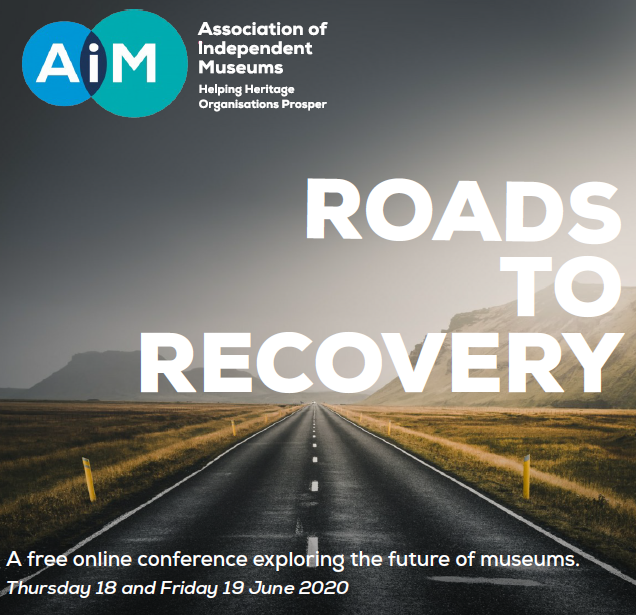Roads to Recovery – 18 and 19 June
This years’ AIM conference, due to take place in Port Sunlight, Merseyside (UK) had to be cancelled due to the Covid-19 pandemic; the conference was held online instead.
AIM Virtual Conference – Roads to Recovery – 18 and 19 June
Our UK representative, Alex, sat in on a couple of online sessions and has put together some notes.
“
The first session I sat through, which was entitled ‘Roads to Recovery’, was introduced by Andrew Lovett (AIM chair). In opening, Andrew noted that circa 700 people from the UK and overseas were joining this virtual conference. He then stressed the importance of both bringing museum people together and personal networks.
There then followed a dialogue between Andrew and Maria Balshaw (Director of the Tate art museums and galleries). These are snippets of some advice that came out of that discussion:
- Some things that have to be different might have to stay different.
- Don’t rush to make decisions: we cannot make all the decisions yet as we do not have enough information. The “data sets aren’t there” as one museum trustee put it.
- The context of climate emergency and social injustice protests ask us to question whether we should keep doing things as we have done them before.
- The quantity-driven way of working is no longer sustainable. Think more now of the impact rather than (attendance) numbers being your KPI.
- We need to accelerate the concept of the museum as a “community anchor”.
- Online video conferences now make training available to those with no travel budgets.
- Each institution needs to make decisions based on their local situations.
- We need to be kind to ourselves and communicate more with our colleagues.
- Take baby steps together; test and learn.
- Communication and collaboration are key.
- If you lobby, do so on behalf of all museums, not just yourself. You are tone-deaf if you just lobby for yourself.
- Messages have to be simple. People stop listening if they are too complex.
The second session Alex sat in on was called, ‘Welcome to the new normal’, and comprised a broad discussion chaired by Bernard Donoghue, Director of ALVA (Association of Leading Visitor Attractions).
This session included a variety of museum curators and directors contributing. These were some of the observations that came out of it:
- Culture and heritage will be all more important post-covid for soft diplomacy and cultural influence.
- The public will come back when they know it is safe.
- There is an extraordinary level of creativity in engaging with others digitally during this time.
- Special places can trigger powerful emotional responses: “You, your staff, your volunteers create the backdrop for people’s happiest memories.”
- The success of the BBC program ‘The Repair Workshop’ shows that when objects are restored they can act as triggers for old memories and experiences.
- Value is not just financial but emotional
- We are attracted by the allure of nostalgia. But nostalgia can be toxic if it is made up of false history and fabrications
- More people are interested to know where they come from.
- Lockdown has made us appreciate home comforts like home baking.
- We haven’t always known about the local legacy of slavery and slaves.
- Confronting those uncomfortable truths has been extraordinary
- History is being made, not re-written.
- We realise that we don’t always like the past.
- Can we do better? Can we engage more? Can we be better storytellers of the whole unvarnished truth of what we collect?
- We are “all in the same storm but not in the same boat”.
- We need to find out the needs of the community.
- Think about multiple uses for venues.
- There is a danger in thinking that digital is “a thing in itself” – it is so much more and less than that.
- Museums will need to change to survive and thrive.
- It is healthy that museums will have to rethink their mission.
- Be aware that the digital offer may only super-serve the avid cultural consumer and culturally engaged.
- Museum mergers may work in some cases but aren’t a silver bullet.
- Develop digital that relates to the school curriculum.
- Independent museums will be hardest hit but also the fastest to recover as they have the clearest focus on users.
- The National Trust in the UK will have to have a more differentiated approach to their sites – not all will be “museums”.
- The wonder of digital isn’t access to information but more about community and connecting them. The direction of travel as a sector is to be more participative and digital is key to that.
- The best museums are the ones that are connected at a local level. Digital can connect but not everyone has digital access.
The conclusion of this second session was that, like the currently popular BBC Repair Shop program, we need to “remove varnish, mend and value what really matters.”

[…] Read more… […]